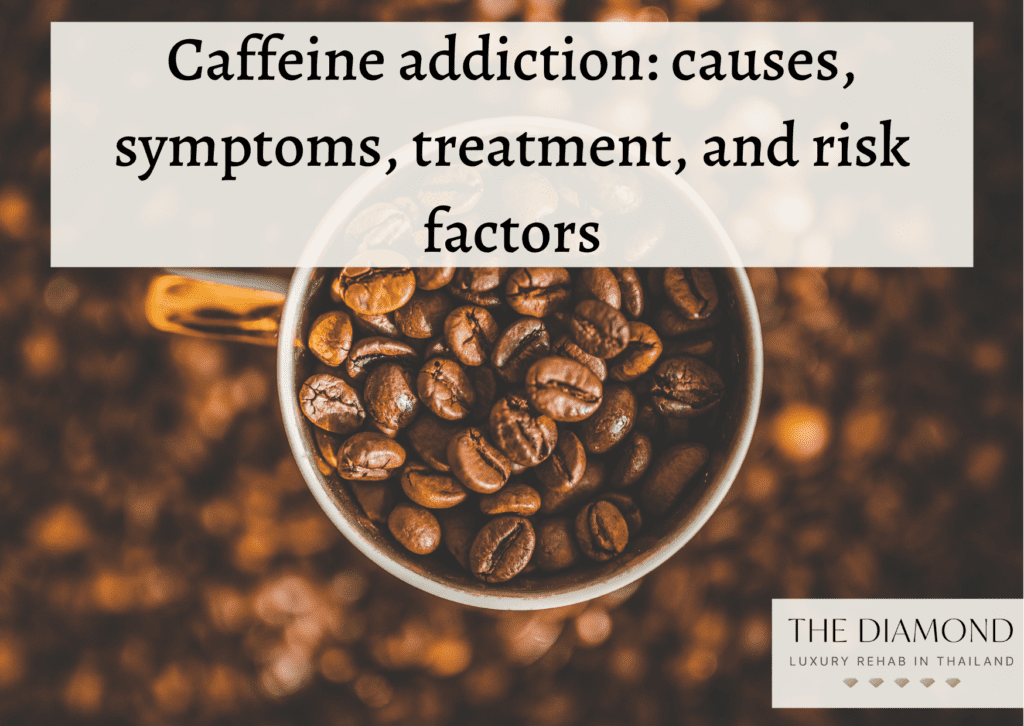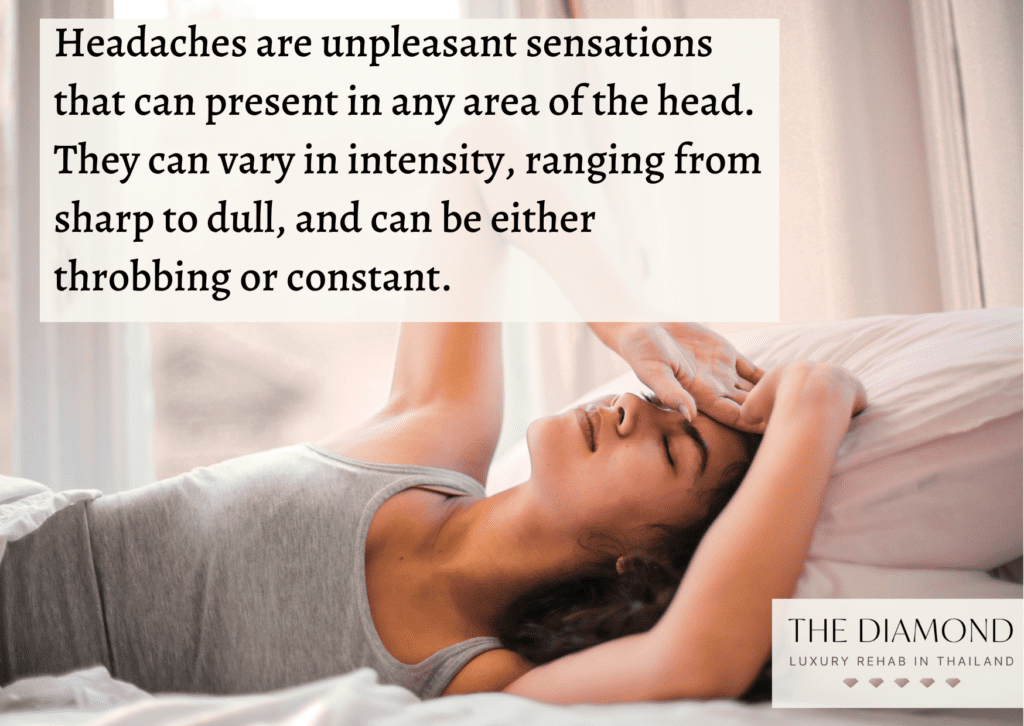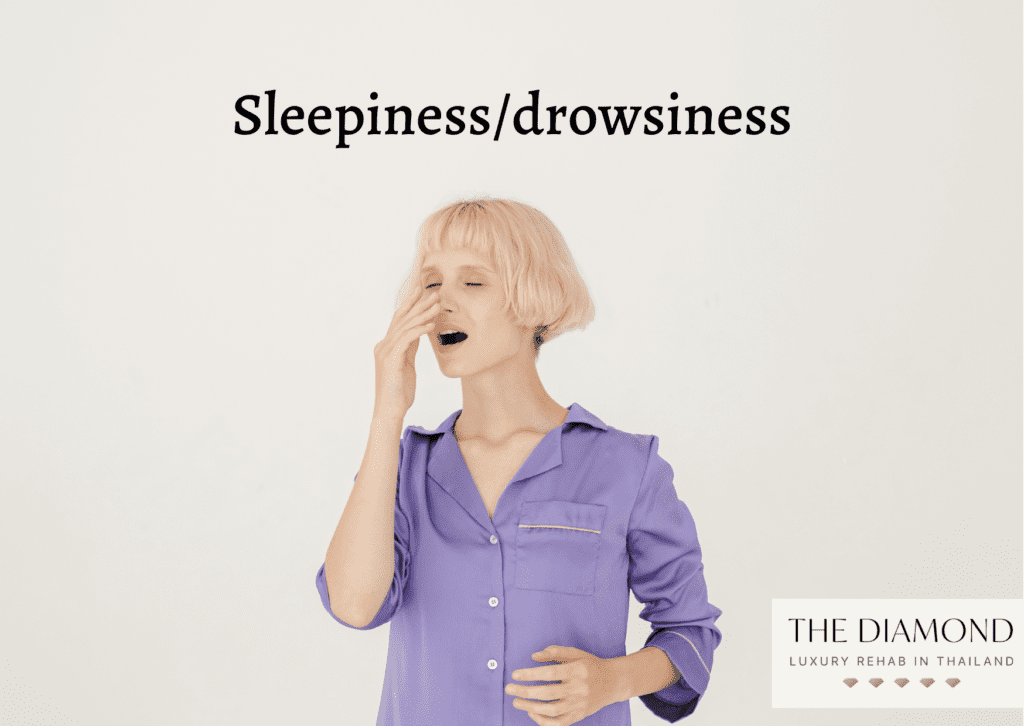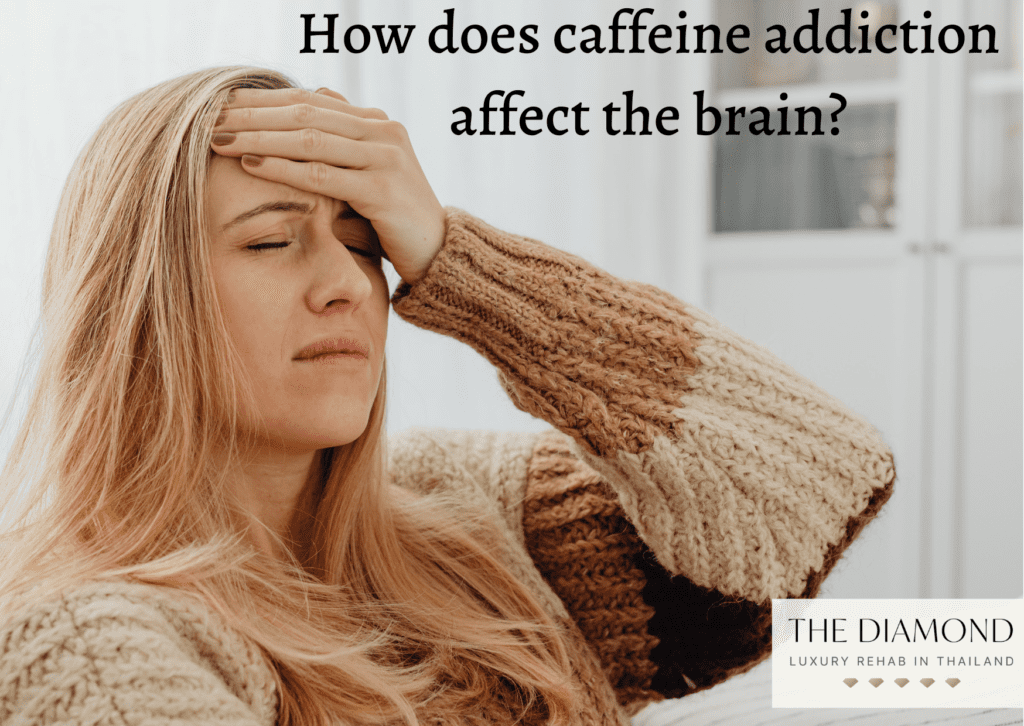Caffeine addiction: causes, symptoms, treatment, and risk factors

Caffeine addiction is the excessive and harmful use of caffeine. Caffeine addiction develops when a person consumes a large amount of caffeine (coffee, energy drinks, etc.) over a long period of time. They might become dependent on caffeine to feel alert or focused.
Coffee addiction can be caused by various factors, including genetics, tolerance, and the need to relieve withdrawal symptoms, such as tiredness and low energy levels.
The symptoms of caffeine dependence include dizziness, feeling shaky, headaches, increased blood pressure, nervousness, racing heart, other heartbeat abnormalities, and sleep issues. These symptoms might interfere with a person’s everyday life and disrupt daily activities.
The treatment of caffeine addiction includes engaging in therapy sessions, utilizing medication, and making necessary adjustments to one’s lifestyle.
What is caffeine addiction?
Caffeine addiction is the long-term harmful and excessive use of caffeinated beverages to the extent that it disrupts daily lives. Although the Diagnostic and Statistical Manual of Mental Disorders, 5th ed., includes caffeine intoxication and withdrawal, it does not specify Caffeine Use Disorder.
Caffeine Use Disorder (CUD) is mentioned in section III of the DSM-5, titled Emerging Measures and Models. According to Merideth Addicot in her 2014 article published in the Current Addiction Reports, this should encourage researchers and academics to research the impacts of caffeine dependence.
Some might refer to caffeine addiction as a behavioral addiction, however, this is inaccurate. Behavioral addiction refers to an addiction to unhealthy non-drug-related behaviors or habits. However, regularly drinking caffeine, which is considered a stimulant drug, could promote a behavioral addiction, according to Dr. Petre in her Healthline article, Are Coffee and Caffeine Addictive? A Critical Look. The context in which coffee is consumed and the emotions associated with its intake are factors that can contribute to the desire for another serving.
How common is caffeine addiction?
Roughly 90% of Americans consume caffeine regularly, and of those users, 8% would meet the criteria for Caffeine Use Disorder, according to United Brain Association. Moreover, in a 2011 study conducted by Striley et al. and published in the Journal of Caffeine Research, about 28% of high school and college students met the criteria for caffeine dependency.
How long does it take to get addicted to caffeine?
It can take anything from a few days to a few years for someone to become addicted to caffeine. A person who exhibits symptoms of caffeine withdrawal (headaches, sleepiness, lack of concentration) or needs caffeine to function may have developed a dependency.
In a 2022 StatPearls composition written by Sajadi-Ernazarova et al., it’s stated that researchers found that as little as three days’ exposure to caffeine could result in caffeine withdrawal symptoms. The longer an individual is exposed to caffeine, the more severe withdrawal symptoms they might experience.
What are the causes of caffeine addiction?
The causes of caffeine addiction are as follows:
- Brain chemistry: Caffeine blocks all types of adenosine receptors in the brain, which tricks the brain into feeling alert. This causes some to become dependent on caffeine to feel alert.
- Genetics: Studies have shown that caffeine addiction could (partly) be influenced by genetics. Caffeine-dependent heritability markers are similar to those of nicotine and alcohol, according to Meredith et al. in their 2013 article published in the Journal of Caffeine Research.
- Tolerance: Similar to other drugs, using caffeine on a regular basis increases tolerance. After a period of time, an individual requires more and more caffeine to achieve the same levels of alertness and concentration.
- Caffeine Withdrawal: In an attempt to reduce caffeine withdrawal symptoms (tiredness, headaches, etc.), individuals continue to consume caffeine on a daily basis, thus increasing their dependency on caffeine.
What are the symptoms of caffeine addiction?
The caffeine addiction symptoms are listed below:
- Dizziness
- Feeling shaky
- Headaches
- Increased blood pressure
- Nervousness
- Racing heart or other heartbeat abnormalities
- Sleep issues
1. Dizziness
Dizziness is the sensation of feeling unsteady, lightheaded, or potentially feeling faint. According to Carta Coffee, people with a sensitivity to caffeine can experience dizzy spells right after drinking a caffeinated beverage.
Dizziness is often caused by decreased blood flow to the brain. A 2009 article by Addicot et al. in the Human Brain Mapping journal found that caffeine can reduce blood flow to the brain by 22% to 30%.
Experiencing dizziness after drinking coffee could indicate caffeine addiction. Dizziness can be alleviated by decreasing caffeine intake gradually.
2. Feeling shaky
Feeling shaky, jittery, or having uncontrollable tremors in the hands can occur when consuming high quantities of caffeine. This is a nervous system and muscular response to caffeine, and in most cases, it is not very dangerous.
Caffeine is a stimulant, according to Nehlig et al., in their 1992 article published in the Brain Research Reviews journal, and some individuals’ nervous systems are more sensitive to caffeine than others. This sensitivity to caffeine could be the cause of jitters or feeling shaky.
Feeling shaky after consuming caffeinated drinks could be a sign of caffeine addiction or excessive consumption. This symptom may last for a few hours as caffeine remains in the bloodstream. To alleviate this, taking a walk and drinking water can help.
3. Headaches

Headaches are unpleasant sensations that can present in any area of the head. They can vary in intensity, ranging from sharp to dull, and can be either throbbing or constant. Caffeine may trigger a headache due to the dehydrating effect that caffeine has on the body. Dehydration is a well-known trigger for headaches, according to a 2021 article published in Current Pain and Headache Reports and authored by Arca et al.
Caffeine-induced headaches are more likely to occur when large quantities of caffeine have been consumed, according to Mostofsky et al. in their 2019 study published in the American Journal of Medicine.
Experiencing headaches after consuming coffee is a clear indicator to cut back on caffeine intake or switch to decaff options. After gradually reducing caffeine intake, the headaches should dissipate.
4. Increased blood pressure
Blood pressure refers to the force at which blood pumps through the heart. Hence when blood pressure increases (hypertension), the heart has to work harder to pump blood.
The A2A adenosine receptor is known to decrease blood pressure, according to Shen and Su in their 2000 article published in the Journal of Cardiovascular Pharmacology, and caffeine is known to block A2A adenosine receptors. Thus caffeine leads to an increase in blood pressure.
This is substantiated in a 2011 meta-analysis conducted by Mesas et al. and published in the American Journal of Clinical Nutrition, which shows that caffeine consumption has caused an acute increase in blood pressure in hypertensive individuals.
High blood pressure notoriously has undetectable symptoms, so it’s vital to have a yearly checkup with a doctor and take steps to reduce caffeine if hypertension is detected.
5. Nervousness
Nervousness is described as a persistent worry about everyday events. Coffee is a nervous system stimulant, and consuming large quantities could induce anxiety-related symptoms. People often feel their heart racing after consuming caffeine, which also induces nervousness.
A 2022 review conducted by Klevebrant and Frick and published in the General Hospital Psychiatry Journal concluded that caffeine quantities equal to 5 cups of coffee could induce anxiety attacks in individuals with a panic disorder, and it can also induce anxiety symptoms in healthy individuals.
When feeling anxiety symptoms (panic and nervousness) after consuming caffeine, consider reducing caffeine intake. If the nervousness persists, consult a healthcare professional.
6. Racing heart or other heartbeat abnormalities
When a heart beats disproportionately fast or irregularly, it’s called a racing heart. Consuming caffeine can cause a brief increase in heart rate, although this usually has no negative effect on healthy people.
Caffeine stimulates the central nervous system, and according to Dr. Powell on StutterHealth.org, it can cause a brief increase in heart rate that usually does not have any damaging effects.
Dietitian Victoria Taylor told the British Heart Foundation that having four to five cups of coffee per day should not result in abnormal heart rhythms. Some report feeling heart palpitations after consuming coffee, although this could indicate caffeine sensitivity.
However, if an individual notices an increased heart rate after consuming a substantial amount of coffee, it may be a sign of caffeine dependency. To ease the discomfort, taking a walk and drinking plenty of water is recommended.
7. Sleep issues
Sleep issues such as insomnia and low sleep quality can affect the daily lives of caffeine users. Consuming excessive amounts of caffeine, especially at night, can cause sleeping issues.
A 2017 systematic review by Clark and Landolt, published in Sleep Medicine Reviews, states that caffeine prolongs sleep latency, reduces sleep efficiency and overall sleep time, as well as reducing the perceived quality of sleep.
To ensure that coffee does not disrupt sleep, it is recommended to refrain from consuming it at least six hours prior to bedtime.
What are the available treatments for caffeine addiction?
The available treatments for caffeine addiction include
- Therapy
- Medication
- Lifestyle changes
1. Therapy
Therapy is a type of treatment that helps an individual to identify and change troubling thoughts or emotions. It is often used to resolve mental or emotional issues, addiction included. Therapy can help an individual deal with the emotional challenges and dependencies regarding caffeine and their caffeine use.
A 2016 trial conducted by Evatt et al. and published in the Journal of Consulting and Clinical Psychology concluded that therapy resulted in a significant reduction in self-reported caffeine use. In addition, only one session of cognitive behavioral therapy with a follow-up helped participants effectively reduce caffeine consumption.
Individuals who are addicted to caffeine would be able to reduce their caffeine intake after one or two therapy sessions and information on how to avoid caffeine withdrawal.
2. Medication
Medication is used to either prevent or treat physical or mental illnesses. There is no medication specifically to counter caffeine addiction. However, medication can be used to alleviate the unpleasant symptoms of caffeine addiction or withdrawal, such as headaches.
There are over-the-counter pain relievers, such as Tylenol or Aspirin, which one can use to treat caffeine-induced headaches. These pain relievers are usually effective immediately to alleviate headaches or other pains.
One should discuss over-the-counter pain relievers with a pharmacist to ensure that caffeine-containing pain relievers are avoided. These will only prolong caffeine withdrawal symptoms.
3. Lifestyle changes
Lifestyle changes refer to small changes made to everyday life to promote overall health. Among these are getting enough sleep throughout the night and slowly decreasing overall caffeine intake.
Replace coffee with tea to keep the habit of drinking a hot beverage but with none of the drawbacks of a high caffeine dose. Lifestyle changes are the most effective way to treat a caffeine addiction, especially changes in which caffeine is completely restricted.
When caffeine intake is abandoned, it may take a week or two to notice a difference since caffeine withdrawal symptoms could last up to nine days, according to Juliano and Griffiths in their 2004 article published in the Psychopharmacology Journal.
What are the symptoms of caffeine withdrawal?
The symptoms of caffeine withdrawal include:
- Headaches
- Irritability
- Depressed mood
- Sleepiness/drowsiness
- Cravings for caffeine (coffee or energy drinks)
- Decreased alertness
1. Headache
Caffeine withdrawal headaches are usually described as pain or pressure that pushes outward from the brain. This symptom is quite common, with 50% of people trying to quit caffeine suffering from headaches. The severity of the headaches usually depends on the prolonged exposure to caffeine.
In a 2009 study led by Addicot et al. and published in the Human Brain Mapping journal, researchers found that withdrawal headaches correspond with an increased cerebral blood flow 20 – 24 hours after caffeine abstention.
When abstaining from caffeine and experiencing headaches, consider taking pain relievers to ease the headaches. If the headaches prevail for over two weeks, seek medical advice.
2. Irritability
Feeling irritated involves feeling angry, frustrated, or impatient after not drinking coffee for a period of time. According to Cleveland Clinic, it can take up to 10 hours for caffeine to clear completely from a person’s bloodstream.
After the caffeine has worked its way out of the bloodstream, some users start to feel irritated as the effects of the caffeine start to wear off. According to Symptoms of Caffeine Withdrawal, a 2019 article published by Medical NewsToday, people who abruptly quit caffeine may experience irritability and headaches.
Feeling irritated could be one of the first symptoms of caffeine withdrawal, although it can be thwarted by going on a walk or doing physical exercise. Caffeine withdrawal irritation is only temporary and should subdue as the body adjusts without caffeine.
3. Depressed mood
Depression-like symptoms are also common in caffeine withdrawal cases, although this dysphoric mood is usually only temporary. This symptom is related to the effect that caffeine has on the brain.
Caffeine consumption blocks adenosine receptors in the brain, according to Daly et al. in their 1994 article published in the Pharmacopsychoecologia journal. However, when caffeine is reduced, the adenosine receptors are activated again. The activation of adenosine receptors is associated with an increase in depression-like symptoms.
The onset of depression-like symptoms a few hours after ceasing caffeine intake could be a clear sign of caffeine withdrawal and should subdue within a few days.
4. Sleepiness/drowsiness

Feeling sleepy is common for individuals who abruptly cut back on large quantities of caffeine. According to Lazarus et al. in their 2011 article published in the Journal of Neuroscience, caffeine promotes wakefulness by blocking adenosines in the brain and constricting blood vessels.
However, when caffeine intake ceases, the adenosine receptors will become unblocked, increasing sleepiness, as well as increasing blood flow through the brain, according to Dr. Lemos from UMass Chan Medical School.
Feeling drowsy from caffeine withdrawal can be unpleasant, but it is temporary and usually goes away within a few days after caffeine abstinence.
5. Cravings for caffeine (coffee or energy drinks)
Cravings for caffeine (coffee or energy drinks) are a common occurrence when an individual starts to cut back on caffeine intake. Caffeine, like other drugs such as amphetamines and heroin, causes a mild dopamine spike, according to Brown University.
As a person drinks more and more caffeine, their body becomes dependent on that dopamine spike. According to WebMD, if the caffeine intake is suddenly restricted, the body will send signals that it wants that dopamine spike again. These signals are usually in the form of cravings.
Luckily, these cravings will subdue as the body adjusts. Cleveland Clinic states that withdrawal symptoms can manifest 12 – 24 hours after caffeine is ceased and can last up to 9 days.
6. Decreased alertness
Decreased alertness is a common withdrawal symptom because many people rely on caffeine to stay alert. They may be hesitant to reduce their caffeine intake as it could lead to decreased alertness.
Reducing caffeine intake can cause decreased alertness as both A1 and A2A adenosine receptors that were blocked become unblocked. These receptors play a role in regulating sleep and waking behavior, according to Bjorness et al. in their 2009 article published in the Current Neuropharmacology.
In a 2000 article published in the Psychopharmacology Journal, Jones et al. discussed how reducing caffeine intake can decrease cerebral blood flow velocity and affect electroencephalography (EEG) activity. These changes are related to withdrawal symptoms, such as decreased alertness.
After a few days without caffeine, the body will adapt and should experience fewer alertness-related symptoms.
Is caffeine withdrawal dangerous?
No, caffeine withdrawal is not considered dangerous. The severity of caffeine withdrawal symptoms can vary from mild to extreme, and the severity is influenced by the daily intake of caffeine before abstinence, according to Sajadi-Ernazarova in their StatPearl article, Caffeine Withdrawal.
How to prevent caffeine addiction?
To prevent caffeine addiction, gradually reduce caffeine consumption over the course of a few weeks. Alternate between decaf and regular coffee, switch to non-caffeinated energy drinks, and track any possible withdrawal symptoms (headaches, tiredness, or low energy).
If caffeine intake is reduced too quickly or cut off too soon, the chances are much more likely for caffeine withdrawal symptoms to develop, according to Cleveland Clinic.
How to get help for caffeine addiction?
There are three treatment methods that offer help for caffeine addiction, including therapy, medications, and lifestyle changes. Cognitive behavioral therapy is ideal for understanding the emotional cause behind caffeine addiction. Thereafter, lifestyle changes can be advised by a medical professional and implemented to reverse caffeine addiction.
How is caffeine addiction diagnosed?
Caffeine addiction is diagnosed through a diagnostic interview. A licensed healthcare provider will discuss recent caffeine habits with you and determine whether your intake should be reduced. A diagnosis is made when a patient shows long-term harmful and excessive caffeine use.
The DSM-5 diagnostic schema for the study of Caffeine Use Disorder includes the following diagnostic criteria, according to Meredith et al., in their 2013 review published in the Journal of Caffeine Research. Firstly, a persistent desire or unsuccessful attempts to cut down on caffeine use. Secondly, continuous use of caffeine despite knowledge of a physical or psychological problem caused by caffeine. Lastly, having characteristic caffeine withdrawal syndrome or engaging in caffeine use to relieve or avoid withdrawal symptoms.
What are the risk factors for caffeine addiction?
The risk factors for caffeine addiction include co-occurring mental health disorders, genetics, and age.
Caffeine addiction is more likely to occur in people with co-occurring mental health disorders, according to the Substance Abuse and Mental Health Services Administration in their 2020 Treatment Improvement Protocol. Co-occurring mental health disorders could include sleep disorders, eating disorders, and anxiety disorders.
A 2010 study conducted by Yang et al. and published in the Psychopharmacology Journal concluded that genetics play a role in how one’s body reacts to caffeine use. Genome association studies have established a connection between variations in adenosine and dopamine receptors and the development of caffeine-induced anxiety and sleep disturbances.
The older people get, the slower their bodies can metabolize caffeine. A 2020 article, Caffeine sensitivity grows as people age, published by UCLA Health, states that coffee drinkers between the ages of 65 and 70 took 33% longer to metabolize caffeine than their younger counterparts. Thus the same amount of coffee could have more severe effects on a 70-year-old than on a 20-year-old.
How does caffeine addiction affect the body?
Caffeine addiction affects the body in the short term by increasing the heartbeat, blood pressure, and urination.
In the long term, caffeine addiction induces constant anxiety, chronic insomnia, stomach issues, and depression, according to a 2019 article published by Alberta Health Services.
According to a 1999 meta-analysis published by Sun Ha Jee et al. in the Hypertension Journal, caffeine addiction could also have long-lasting effects on the body’s blood pressure or worsen hypertension.
How does caffeine addiction affect the brain?

Caffeine is a central nervous system stimulant that affects the brain by increasing memory, alertness, and cognitive function. Caffeine binds to adenosine receptors in the brain, blocking the binding of adenosine and ultimately reducing depression-like symptoms, according to Fiani et al. in their 2021 article published in the Cureus Journal of Medical Science.
However, caffeine addiction has been linked to reduced brain volume, which puts an individual at risk for brain diseases such as stroke or dementia, according to the University of South Australia.
Gray matter refers to the components of the central nervous system, which are mainly composed of nerve cells. In an article published in the Cerebral Cortex Journal in 2021, Lin et al. discussed a study they examined. The study revealed that individuals who had recently consumed caffeine had a lower volume of gray matter compared to those who had not consumed caffeine.
How addictive is caffeine compared to other stimulant drugs?
Caffeine is not as addictive compared to other stimulant drugs, such as cocaine or amphetamines. Caffeine does not affect the brain in the same way that other stimulants do. According to the Addiction Center, it lacks the capacity to cause a significant dopamine surge that would disrupt the brain’s reward system, as observed with other stimulant drugs.
The withdrawal symptoms of caffeine addiction are also much milder than those related to cocaine or amphetamines withdrawal.
Is caffeine physically addictive?
Yes, caffeine can be mildly physically addictive due to the small dopamine release that this stimulant offers its users, according to Meredith et al. in their 2013 article published in the Journal of Caffeine Research.
However, regular caffeine consumption typically does not pose the same risks to physical health and emotional/social well-being as highly addictive substances such as alcohol, opiates, cocaine, and methamphetamines. As a result, according to Dr. O’Keefe et al. in their 2013 paper published in the Journal of the American College of Cardiology, experts in substance abuse generally do not view caffeine dependence as a significant addiction

